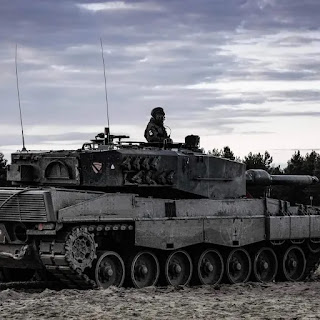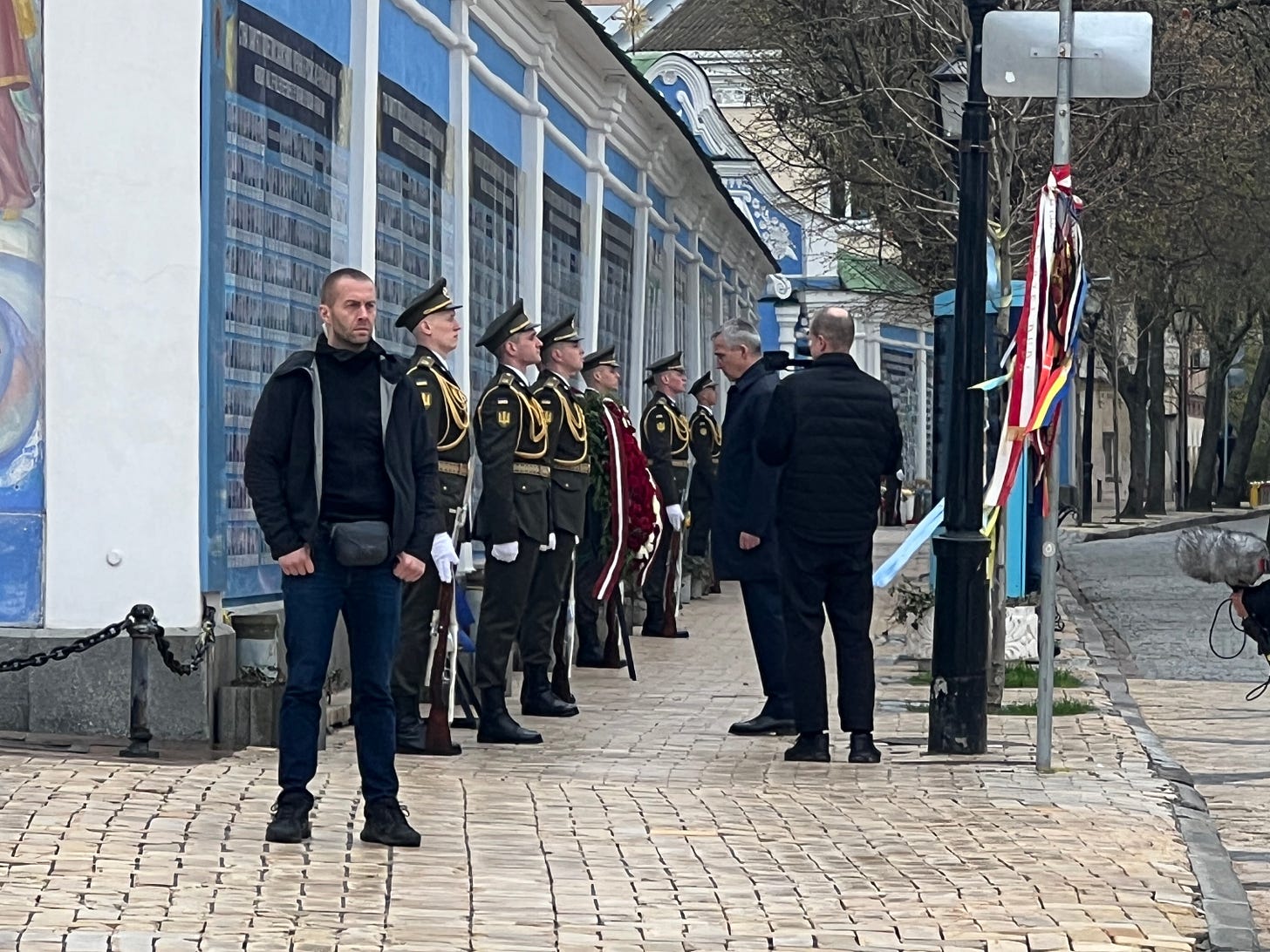According to the headline writers, Ukraine is "clinging" to Bakhmut. A credibility issue arises when sentient observers note that the clinging has been going on for about 7 months now.
At some point it should be obvious that there is a well-thought-out strategy behind what is obviously more about opportunity than desperation. JL
Phillips O'Brien reports in his substack:
Headlines (about) Ukraine ‘clinging’ to Bakhmut are growing tired. Its been recycled for months now, with stories of how Ukraine was about to be pushed out of Bakhmut. (But) the Ukrainian general staff laid out a coherent strategy in late 2022, which explained why the Ukrainians would fight for Bakhmut and similar places. They needed to waste Russian forces, not give the Russians more territory to prepare defensive lines, whilst giving Ukrainians as much time possible to prepare. The coming Ukrainian counteroffensive and the enormous losses Russia has suffered at Bakhmut work together.Ukraine ‘Clings’ on to Bakhmut
If you noticed this headline being thrown around this morning, you might have had a sense of deja vu. It was the major headling for the Washington Post story on the war:
https://www.washingtonpost.com/world/2023/04/23/bakhmut-destroyed-city-ukraine-war/
Now, reporters don’t write their headlines, so its not their fault, but the Ukraine ‘clinging’ on framing of the story in Bakhmut is growing tired. Its been recycled for months now, with dramatic stories of how Ukraine was about to be pushed out of Bakhmut, etc, etc. There was a particular rash of these stories 7 weeks ago, when the situation in Bakhmut was assumed to be perilous.
https://www.nytimes.com/2023/03/03/world/europe/bakhmut-ukraine-russia.html
https://www.nbcnews.com/news/world/ukraine-clings-bakhmut-russians-advance-rcna73028
Now here we are with the exact same headlines, and in many ways the exact same stories, being written about Bakhmut. That is one of the main reasons that Mykola Bielieskov and I wrote this piece for the Atlantic.
What we are trying to say is that there is, and has been throughout, a consistent Ukrainian strategy underlying their decision to fight for the city. Here is a summary of the overall argument, excerpted from the start of the article.
“For many months now, Ukrainian and Russian forces have been waging a bloody battle over what might look like the most insignificant of locations. On tiny patches of land around small cities in the Donbas region—such as Avdiivka, Vuhledar, and, most famously, Bakhmut—the combat has been so intense that many Western commentators and outlets have been second-guessing and criticizing the Ukrainian government’s insistence on continuing to fight in those areas. Far better, their argument goes, for the Ukrainians to pull out of the cities and take up new, more easily defended positions in the countryside, leaving the Russians—who seem willing to devote enormous quantities of soldiers and equipment to the fight—only small gains of little military value. Some observers even claim that, in holding on to Bakhmut, the Ukrainians might be jeopardizing their expected counteroffensive, in part by using so many munitions to defend the city.
But Ukraine does not have the luxury of choosing where it has to fight, precisely because it is preparing a counteroffensive. As it seeks to roll back the Russian forces that advanced farther into Ukrainian territory in last year’s Battle of the Donbas, Ukraine needs some time to master a wide variety of new equipment provided by its European allies and the United States, while simultaneously wearing down Russian troops and equipment.”
War is a terrible and brutal business. However the Ukrainian general staff, including General Zaluzhny himself, laid out a coherent strategy in late 2022, which explained why the Ukrainians would fight for Bakhmut and similar places. They needed to waste Russian forces, not give the Russians any more territory to prepare defensive lines, whilst giving Ukrainians as much time possible to prepare.
Here is one excerpt on twitter.
https://twitter.com/andrewsweiss/status/1603471448894586880?s=20
It was a conscious choice, and one that I believe has made a great deal of sense, even though it seems bloody and desperate. In a few months, the Russians have advanced a few miles at terrible costs—and are still throwing in more and more troops. Ukraine might soon decide the fight is no longer worth continuing, however for now it seems part of a coherent strategy and I, for one, will continue to give Zaluzhny the benefit of the doubt.
I think its also worth noting that Hannah Maliar, the Ukrainian Deputy Minister of Defense, has both talked about the multi-faceted elements of the coming Ukrainian counteroffensive, and how the enormous losses Russia has suffered at Bakhmut (see link below) work together.
https://www.ukrinform.net/rubric-ato/3697975-maliar-bakhmut-has-already-become-one-of-most-expensive-operations-for-russia.html
Here is an excerpt of her argument.
“As for Bakhmut, the deputy minister emphasized, the enemy has thrown all its forces to take control of the city. "But they throw weapons and equipment there. It is very important for them. It seems that this is not even only from a military point of view, but also from a political point of view because they threw all their propaganda at Bakhmut. And, accordingly, in order to restrain them, we must also concentrate a large amount of effort there. Indeed, since they cannot fight with us in street battles because they will lose, they have resorted to their proven Syrian tactics and are effectively wiping buildings off the face of the earth. In such a situation, it is very difficult to hold positions. In fact, it is impossible to hold them in such a situation. Indeed, there is a slight advance of the enemy in certain areas," Maliar said, noting that the Armed Forces of Ukraine have been preventing the enemy from capturing Bakhmut for eight months already.”
Counteroffensive
Speaking of the Ukrainian counteroffensive, the smoke gets ever smokier. Maliar spoke as if it had already begun, on the one hand, and others, spoke as if it is still a ways off. President Zelensky talked about the counteroffensive in what seemed like imminent terms (https://kyivindependent.com/ukraine-war-latest-kyiv-readies-for-counteroffensive-nato-confident-ukraine-ready-to-liberate-more-territories/) and the Ukrainian military trolled the Russians with constant videos of preparing Ukrainian soldiers.
This very morning the Institute for the Study of War passed on information from Russian telegram channels that Ukrainian forces had crossed the Dnipro near Kherson, which if it is done in force, would be a major development. Its worth noting that these stories are beginning to circulate widely.
https://twitter.com/Mylovanov/status/1650051320332550144?s=20
All of this should be exactly what Ukraine wants—and guess what, no one know what is the truth or not. Maybe we will know a little more next weekend—but maybe not.
Ballbearings and War Production
I had a little fun when I came across this story of Russian war production being damaged by a lack of high-quality ball-bearings.
https://twitter.com/PhillipsPOBrien/status/1649489934787440640?s=20
The funny thing, as those who know my work on WWII would have figured, is this is precisely the kind of reason why I thought people were drastically overrating Russian power before 24 February 2022. Russia is not an economic/technological leader, and relies on imports of a massive range of high quality goods to make its war material. Earlier in the war the focus was on problems in getting microchips (which Russia cant manufacture itself) and now its on high quality ball bearings—again something that is beyond Russian manufacturing capabilities (and even might be beyond Chinese at present). Without high quality industrial products like ball-bearings, Russia either wont be able to make, or will make really crappy, new war material. Its why Ive always tried to say that the sanctions on the Russian economy are far more important than people realize. Its not about depriving Russia of money, its about depriving Russia of the high quality/high tech goods it cant make for itself. You can have all the petro-dollars in the world, but if you have no good ball bearings, you cant make a new tank.
NATO
The most interesting visitor to Kyiv this week was Jens Stoltenberg, the NATO Secretary General. His visit was both poignant (he visited the striking memorial wall just outside of St Michael’s Cathedral in central Kyiv).
The most important geopolitical part of his visit, however, was easily his discussions of how Ukraine is being prepared for NATO membership. He said clearly that Ukraine’s future is to be in NATO.
https://twitter.com/nytimes/status/1649084289294712832?s=20
Just over a year ago the idea that this would happen was denounced as fanciful in certain realist circles—something that would result in war with Russia. Well, turns out that Russia invaded Ukraine precisely because Ukraine was not in NATO, and the way that Ukraine has fought has made it clear that not only should Ukraine be in NATO, it will be. This is one of the only good things to have come out of Putin’s horrific decision to opt for a full-scale decision. It has given a certain clarity to Europe’s future. There will be Russia, a few neutralist states whose security is guaranteed tacitly by NATO, and NATO. If a European state wants to be in NATO—it should be.






















0 comments:
Post a Comment